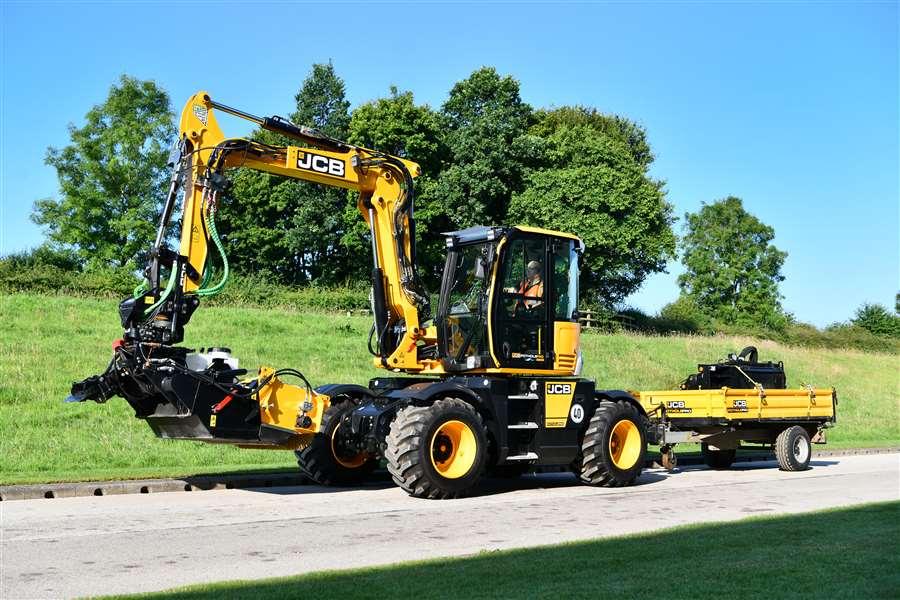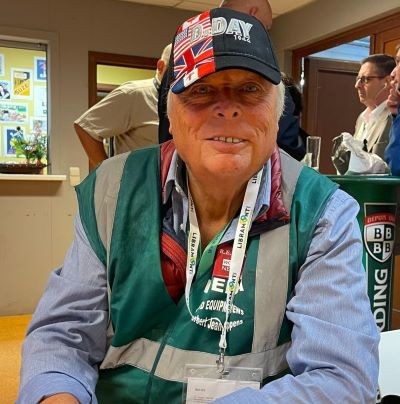JCB New towing regulation helps UK machine users
 29/07/24-FR-English-NL-footer
29/07/24-FR-English-NL-footer
Une nouvelle réglementation sur le remorquage aide les utilisateurs de machines britanniques
 Image- JCB
Image- JCB
JCB a déclaré avoir contribué à obtenir un changement de réglementation autorisant le remorquage de remorques sur la route par des engins de construction à roues.
La décision a un impact sur les règles de remorquage en Angleterre, en Écosse et au Pays de Galles et a conduit l'Agence de certification des véhicules (VCA) à établir une nouvelle commande spéciale de véhicule (VSO).
Avec la nouvelle réglementation, les utilisateurs de machines seront autorisés à utiliser des machines d'ingénierie sur roues, telles que des chargeuses-pelleteuses et des pelles sur pneus, pour remorquer une remorque sur l'autoroute pour la construction, l'entretien et la réparation des routes.
Richard Brooks, directeur de l'innovation produit du groupe chez JCB, a déclaré : « La reconnaissance par le VCA des avantages du remorquage en toute sécurité d'une remorque derrière ce type de machines à roues sera bien accueillie par les entrepreneurs et les propriétaires d'équipement.
« Nous avons fait pression pour ce changement de législation, car il augmentera considérablement la polyvalence et la productivité de ce type de machine sur roues. En tirant une remorque vers et depuis le site, les clients réduiront le besoin de véhicules supplémentaires pour transporter des matériaux et des outils, réduisant ainsi les émissions et le trafic inutile, tout en augmentant l'efficacité de l'entretien et de la réparation des routes.
JCB a déclaré avoir démontré au ministère des Transports (DfT) et au VCA que leurs machines peuvent faciliter de manière efficace et efficiente la réparation des nids-de-poule. En conséquence, une exception temporaire a été accordée à l'ordonnance générale de 2003 sur les véhicules routiers (autorisation de types spéciaux).
Ce changement s'applique aux chargeuses-pelleteuses ainsi qu'aux pelles sur pneus. Ces machines seront autorisées à remorquer des remorques à vide ou des remorques transportant des matériaux ou des outils vers et depuis les chantiers de construction, de réparation ou d'entretien des routes. Cette flexibilité améliorera la productivité des clients et réduira le besoin de transport supplémentaire.
Selon la nouvelle réglementation, les machines peuvent remorquer sur tous types de routes à l'exception des autoroutes, à des vitesses allant jusqu'à 20 mph. Cependant, l'usine d'ingénierie sur roues doit être immatriculée sur route et se conformer à tous les aspects pertinents du Règlement sur les véhicules routiers (construction et utilisation) de 1986. La longueur combinée de la machine et de la remorque ne peut pas dépasser 8 m et la remorque doit porter la même plaque d'immatriculation. comme la machine de remorquage.
Pour bénéficier de ce changement de loi, les exploitants peuvent introduire une demande écrite auprès du VCA, indiquant leur intention d'utiliser un ou plusieurs engins pour le remorquage sur route. Les candidatures doivent être envoyées à vso@vca.gov.uk et doivent inclure le nom de la personne ou de l'organisation qui présente la candidature.
NJC.© Info JCB
-------------------------------------------------------------------------------------------------------------
 29/07/24-English
29/07/24-English
New towing regulation helps UK machine users
 Image- JCB
Image- JCB
JCB said it had helped secure a change in regulations which will allow trailers to be towed on the road by wheeled construction machinery.
The decision impacts towing rules in England, Scotland, and Wales and has led the Vehicle Certification Agency (VCA) to establish a new Vehicle Special Order (VSO).
With the new regulation, machine users will be allowed to use wheeled engineering machinery, such as backhoe loaders and wheeled excavators, to tow a trailer on the highway for construction, maintenance, and repair of roads.
Richard Brooks, Group Product Innovation Director at JCB, said, “Recognition by the VCA of the benefits of safely towing a trailer behind these types of wheeled machines will be welcomed by contractors and equipment owners.
“We have been pushing for this change in legislation, as it will greatly increase the versatility and productivity of this type of wheeled machine. By towing a trailer to and from site, customers will reduce the need for additional vehicles to carry materials and tools, cutting emissions and unnecessary traffic, while increasing efficiency in road construction maintenance and repair.”
JCB said it demonstrated to the Department for Transport (DfT) and VCA that their machinery can effectively and efficiently facilitate the repair of potholes. As a result, a temporary exception has been granted to The Road Vehicles (Authorisation of Special Types) General Order 2003.
This change applies to backhoe loaders as well as wheeled excavators. These machines will be permitted to tow unladen trailers or trailers carrying materials or tools to and from road construction, repair, or maintenance sites. This flexibility will enhance productivity for customers and reduce the need for additional transportation.
Under the new regulations, the machines can tow on all types of roads except motorways, at speeds of up to 20mph. However, the wheeled engineering plant must be road-registered and comply with all relevant aspects of the Road Vehicles (Construction and Use) Regulations 1986. The combined length of the machine and trailer cannot exceed 8m, and the trailer must bear the same number plate as the towing machine.
To take advantage of this change in the law, operators can submit a written application to the VCA, stating their intention to use a machine or multiple machines for towing on the road. Applications should be sent to vso@vca.gov.uk and must include the name of the individual or organization making the application.
NJC.© Info JCB
----------------------------------------------------------------------------------------------------------------
 29/07/24-NL
29/07/24-NL
Nieuwe sleepregelgeving helpt Britse machinegebruikers
 Image-JCB
Image-JCB
JCB zei dat het heeft geholpen bij het bewerkstelligen van een wijziging in de regelgeving, waardoor aanhangwagens door bouwmachines op wielen over de weg kunnen worden gesleept.
Het besluit heeft gevolgen voor de sleepregels in Engeland, Schotland en Wales en heeft ertoe geleid dat de Vehicle Certification Agency (VCA) een nieuwe Vehicle Special Order (VSO) heeft opgesteld.
Met de nieuwe regelgeving mogen machinegebruikers technische machines op wielen, zoals graaflaadmachines en mobiele graafmachines, gebruiken om een aanhangwagen over de snelweg te trekken voor de aanleg, het onderhoud en de reparatie van wegen.
Richard Brooks, Group Product Innovation Director bij JCB, zei: “Erkenning door de VCA van de voordelen van het veilig trekken van een aanhanger achter dit soort machines op wielen zal worden verwelkomd door aannemers en eigenaren van apparatuur.
“We hebben aangedrongen op deze wetswijziging, omdat deze de veelzijdigheid en productiviteit van dit type machines op wielen enorm zal vergroten. Door een aanhangwagen van en naar de locatie te trekken, zullen klanten de behoefte aan extra voertuigen om materialen en gereedschappen te vervoeren verminderen, waardoor de uitstoot en het onnodige verkeer worden verminderd, terwijl de efficiëntie bij het onderhoud en de reparatie van wegenbouw wordt verhoogd.”
JCB zei dat het aan het Department for Transport (DfT) en VCA heeft aangetoond dat hun machines het repareren van kuilen effectief en efficiënt kunnen vergemakkelijken. Als gevolg hiervan is een tijdelijke uitzondering verleend op de General Order 2003 voor wegvoertuigen (autorisatie van speciale typen).
Deze wijziging geldt voor zowel graaflaadmachines als mobiele graafmachines. Deze machines mogen onbeladen aanhangwagens of aanhangwagens met materiaal of gereedschap van en naar wegenbouw-, reparatie- of onderhoudslocaties trekken. Deze flexibiliteit zal de productiviteit voor klanten verhogen en de behoefte aan extra transport verminderen.
Volgens de nieuwe regelgeving kunnen de machines op alle soorten wegen slepen, met uitzondering van snelwegen, met snelheden tot 32 km/uur. De technische fabriek op wielen moet echter geregistreerd zijn op de weg en voldoen aan alle relevante aspecten van de Road Vehicles (Construction and Use) Regulations 1986. De gecombineerde lengte van de machine en de aanhangwagen mag niet groter zijn dan 8 meter, en de aanhangwagen moet hetzelfde kenteken dragen. als trekmachine.
Om van deze wetswijziging te profiteren, kunnen exploitanten een schriftelijke aanvraag indienen bij de VCA, waarin zij hun voornemen kenbaar maken om een machine of meerdere machines te gebruiken voor het slepen over de weg. Aanvragen moeten worden verzonden naar vso@vca.gov.uk en moeten de naam bevatten van de persoon of organisatie die de aanvraag indient.
NJC.© Info JCB
-------------------------------------------------------------------------------------------------------------------
Date de dernière mise à jour : 25/07/2024














